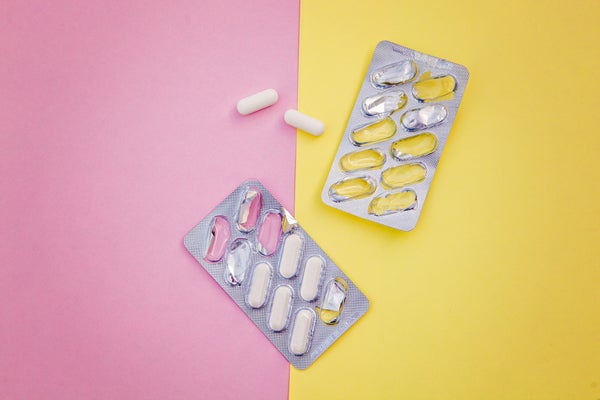This article was published in Scientific American’s former blog network and reflects the views of the author, not necessarily those of Scientific American
One summer afternoon in 1989, I popped a giant tablet of amoxicillin into my mouth and washed it down with a big gulp of water. After confirming that I had not asphyxiated and died, I jumped up to celebrate. I had swallowed a pill for the first time and was thus directly transformed from an eight-year-old boy into a full grown, pill-taking man. I expected facial hair to arrive at any moment.
Sadly, the celebration ended a few moments later, when I saw the 41 other amoxicillin tablets in the bottle and remembered my doctor telling me to “finish the course” of antibiotics—even if my ear infection resolved. Since then, times have changed. While some doctors still urge patients to finish lengthy antibiotic treatments for simple infections, the evidence for this recommendation has largely been debunked.
Actually, the evidence never really existed. Traditional antibiotic prescriptions, often written for seven, 10 or 14 days weren’t based on science—they might well have come instead from associations with familiar numbers, such as the number of days in a week or toes on our feet. But for many infections, recent research has shown that shorter antibiotic durations are just as effective, often with fewer harmfulside effects.
On supporting science journalism
If you're enjoying this article, consider supporting our award-winning journalism by subscribing. By purchasing a subscription you are helping to ensure the future of impactful stories about the discoveries and ideas shaping our world today.
Shorter antibiotic courses have been found to be equivalent to longer ones not only for minor infections but for some severe infections as well. For example, in the well-named STOP-IT (Study to Optimize Peritoneal Infection Therapy) trial, patients treated for complicated intra-abdominal infections were randomized to receive either four days of antibiotics or the standard duration, which was twice as long. There was no significant difference in outcomes between the two groups. Similar studies supporting shorter antibiotic courses have been published for the treatment of bloodstream infections, pneumonia, cellulitis and several other types of infections, which suggests that the traditional approach to using prolonged antibiotic durations may be unsound.
And the idea that we should “finish the course” of antibiotics, even after feeling better, is just as dubious. This practice stems from the misguided belief that not using a long course of antibiotics may result in treatment failure or bacterial resistance. But most simple infections are probably gone by the time symptoms resolve, so finishing that whole bottle of pills may not be necessary — especially when the “course” was arbitrarily long to begin with.
And in many cases, the antibiotics may not be necessary at all. An estimated 30 percent of antibiotic prescriptions in the U.S. may be inappropriate, largely because of incorrect use for colds and other viral infections.
As a young boy clutching my first orange pill bottle, I wondered what horrors would transpire if I didn’t finish all of the tablets inside. Would the brief jolt of antibiotics only make the bacteria more angry and malicious, like poking a beehive with a stick? Would the little monsters then leap from my ear canal to infect innocent bystanders, like my best friend Jamie? They wouldn’t hurt Jamie, would they? I swallowed every pill over the next two weeks, too scared to find out.
In reality, I should have been more worried about the harms of taking too many antibiotics than about taking too few. The true dangers of antibiotic overuse are much scarier than whatever I could think up back then.
For individuals, antibiotic overuse may result in allergic reactions, debilitating side effects and disruption of the normal, healthy bacteria in the body. This disruption may lead to severe intestinal infections with Clostridioides difficile, or C. diff, which affects hundreds of thousands of people and causes thousands of deaths in the U.S. each year.
More broadly, antibiotic overuse contributes to the growing epidemic of antibiotic resistance. Although long courses of antibiotics were once thought to prevent resistance, we now know that overuse actually causes more resistance to develop. In the U.S. each year, about 2.8 million resistant infections occur, and 35,000 Americans die from them, making antibiotic resistance an imminent threat to public health.
So what is the solution? Should we ignore our doctors and stop taking antibiotics wherever we feel like it?
Probably not. While many infections are overtreated, some, such as heart-valve or bone infections, really do require long courses of antibiotics, and stopping early could be harmful. Instead patients and doctors need to reach a better shared understanding of the benefits and limitations of antibiotics and to recognize that antibiotics are a fragile resource that must be protected by using them only when needed and for the briefest possible time.
Doctors and other prescribers bear the primary responsibility for antibiotic overuse, and they should work to reduce antibiotic consumption by ending unnecessary prescriptions. They must embrace the evidence that shorter treatment durations are often equivalent to longer ones and banish the outdated “complete the course” dictum from their vocabulary. Patients can contribute to reducing the problem by not requesting antibiotics for colds and other viral infections. And if they are given antibiotics for what seems like too long, they can simply ask the prescriber if that duration is really necessary.
Among the many things that I had yet to learn in 1989 was that swallowing an antibiotic pill for the first time isn’t really something to be proud of. If my doctor had instead given me the shortest possible course of treatment, along with a lesson on why antibiotics are so precious, that would have been a true reason to celebrate.
